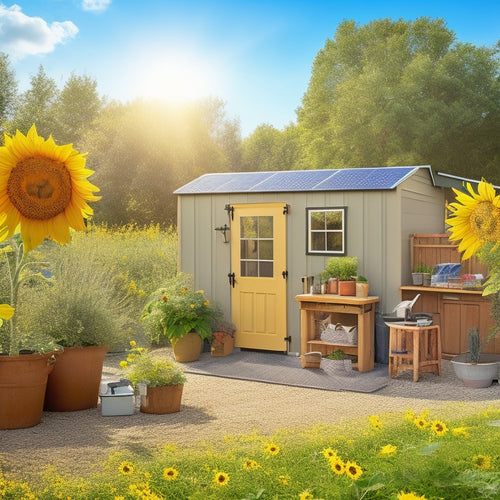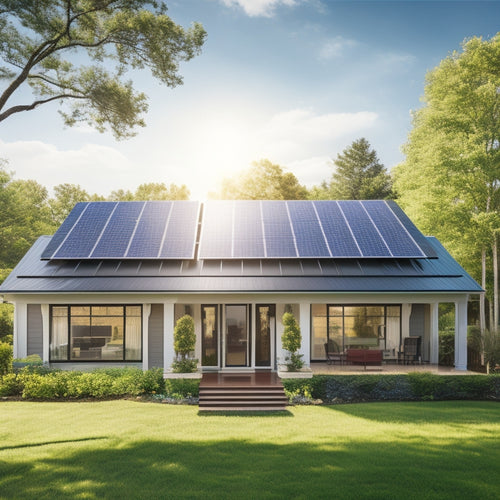
Solar Energy Solutions for Farm Water Pumping Systems
Share
You're investing in a farm's future by switching to solar energy solutions for water pumping systems, a decision that can greatly reduce your energy costs, carbon footprint, and reliance on fossil fuels. Solar powered pumps can increase independence from the grid, decrease energy bills, and promote environmental stewardship. Off-grid solar panel systems and energy storage options like batteries can guarantee a reliable water supply. A well-designed solar array can optimize energy production, and you can take advantage of incentives like tax credits and government grants. Explore how to maximize your benefits and make the most of this sustainable choice.
Key Takeaways
• Solar-powered pumps reduce energy costs and carbon footprint, promoting environmental stewardship and increasing independence from the grid.
• Off-grid solar panel systems are ideal for rural areas with limited grid access, providing a reliable water supply for crops.
• Energy storage solutions like Lead-Acid, Lithium-Ion, and Flow Batteries can be used for water pumping, with regular maintenance crucial for longevity.
• Efficient solar array design is essential to optimize energy production, considering factors like panel orientation, shading, and row spacing.
• Solar energy solutions for farm water pumping systems can generate revenue through incentives like the Solar Investment Tax Credit (ITC) and lower electricity bills.
Benefits of Solar Powered Pumps
Moreover, substantially reduce your farm's energy costs and carbon footprint by switching to solar powered pumps. This can also increase your independence from the grid, which is crucial for irrigation systems that are often the largest energy consumers on a farm.
With solar powered pumps, you can notably decrease your energy bills and allocate those resources to other areas of your operation. In addition, solar powered pumps promote environmental stewardship by reducing your farm's reliance on fossil fuels and lowering greenhouse gas emissions. This not only benefits the environment but also enhances your farm's reputation and contributes to a more sustainable future.
Additionally, solar powered pumps can lead to increased crop yield by providing a reliable and consistent water supply, ensuring your crops receive the necessary water to thrive. By making the switch to solar powered pumps, you can enjoy these advantages while also future-proofing your farm for a more sustainable tomorrow.
Off-Grid Solar Panel Systems
You can power your farm's water pumping system with an off-grid solar panel system, which operates independently of the grid and provides a reliable source of energy. This type of system is ideal for rural areas where access to the grid is limited, promoting rural electrification.
Off-grid solar panel systems consist of solar panels, a charge controller, an inverter, and a battery bank. The solar panels convert sunlight into electrical energy, which is then stored in the battery bank. The charge controller regulates the energy flow, making sure the batteries aren't overcharged or undercharged. The inverter converts the stored energy into usable power for your water pumping system.
Regular battery maintenance is essential to guarantee the longevity of your off-grid solar panel system. You should monitor the battery's state of charge, voltage, and temperature to prevent damage. A well-maintained battery bank can last up to 10 years, providing a reliable source of energy for your farm's water pumping system.
Energy Storage for Water Pumping
When it comes to powering your farm's water pumping system, energy storage plays a vital role in guaranteeing a reliable and consistent supply of energy. You need a backup plan to make sure your pumps keep running, even when the sun isn't shining. This is where energy storage comes in, providing a buffer against grid outages and periods of low solar radiation.
| Energy Storage Technology | Advantages | Challenges |
|---|---|---|
| Lead-Acid Batteries | Low upfront cost, well-established technology | Limited cycle life, heavy maintenance requirements |
| Lithium-Ion Batteries | High energy density, long cycle life | Higher upfront cost, sensitive to temperature |
| Flow Batteries | Scalable, flexible design | Higher upfront cost, complex installation |
Regular battery maintenance is essential to ensure the longevity of your energy storage system. This includes monitoring state of charge, voltage, and temperature, as well as performing routine cleaning and inspections. Additionally, considering a grid connection can provide an added layer of reliability, allowing you to draw from the grid during periods of low energy production. By understanding the different energy storage options and their advantages, you can make an informed decision about the best solution for your farm's water pumping system.
Designing an Efficient Solar Array
Optimize your farm's energy production by carefully designing your solar array, taking into account factors like panel orientation, shading, and row spacing to maximize energy yield.
When determining the ideal panel orientation, consider the direction your farm receives the most sunlight. Typically, a south-facing orientation is best, but this may vary depending on your location and surrounding landscape.
Conduct a thorough shading analysis to identify any potential obstructions, such as trees or buildings, that could cast shade on your solar array. This will help you determine the best panel placement and configuration to minimize energy losses.
Row spacing is also important, as it affects the airflow and heat dissipation around your panels. Proper spacing can increase energy production and reduce the risk of overheating.
Cost Savings and Incentives
Designing an efficient solar array is just the first step; now, it's time to reap the financial benefits, as a well-designed system can greatly reduce your farm's energy expenses and even generate revenue through various incentives. By switching to solar energy, you can considerably lower your electricity bills, allowing you to allocate more resources to other areas of your farm.
Additionally, you can take advantage of tax credits and government grants designed to encourage the adoption of renewable energy sources. For instance, the Solar Investment Tax Credit (ITC) allows you to claim a credit of up to 30% of the total cost of your solar array. You may also be eligible for government grants, such as the Rural Energy for America Program (REAP), which provides financial assistance to farmers and rural businesses shifting to renewable energy.
Frequently Asked Questions
How Often Should I Clean My Solar Panels to Ensure Optimal Performance?
You should clean your solar panels every 6-12 months to prevent dust accumulation, which reduces panel efficiency by up to 25%. Cleaning them regularly guarantees peak performance and maximizes energy output.
Can I Use a Solar-Powered Pump for Livestock Watering Systems?
You can use a solar-powered pump for livestock watering systems, taking into account livestock behavior and water quality; make sure the pump's flow rate matches the animals' drinking habits and maintains water quality by preventing bacterial growth.
Are Solar-Powered Pumps Suitable for Large-Scale Irrigation Systems?
You're wondering if solar-powered pumps can handle large-scale irrigation systems; the answer depends on the energy demands of your system - if it's massive, you may need multiple solar arrays or hybrid systems to meet the power requirements.
Do Solar-Powered Pumps Require More Maintenance Than Traditional Pumps?
You'll find that solar-powered pumps guarantee less maintenance than traditional pumps, thanks to fewer moving parts, increasing pump efficiency and reducing downtime, while energy reliability assures consistent performance with minimal upkeep.
Can I Use Solar Power to Supplement My Existing Electric Pump System?
You can supplement your existing electric pump system with solar power by grid-tying your solar array to the grid, or using energy storage systems to offset peak demand and reduce your energy bills.
Related Posts
-

How to Achieve a Zero-Waste Lifestyle for a Greener Tomorrow
To achieve a zero-waste lifestyle, start by adopting the principles of refusing, reducing, reusing, and recycling. Sw...
-

Building an Emergency Backup Solar Power System in 5 Essential Steps
Building an emergency backup solar power system involves five key steps. First, assess your daily energy needs to ide...
-

Home Solar Installation Cost
You're considering installing solar panels on your home, and the upfront cost is likely the biggest hurdle standing i...


